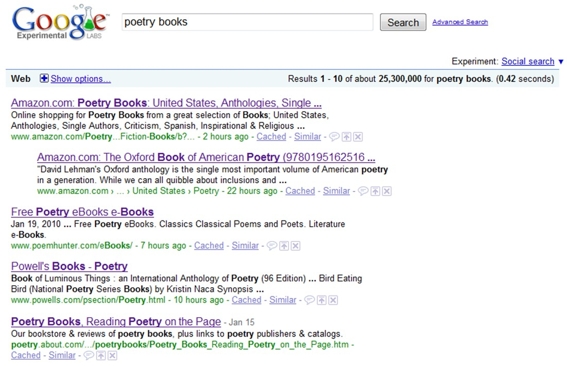Despite my contention that Internet marketers need to stop obsessing about rankings, an examination of the SEO tactics of competitors that outrank your site can be extremely enlightening. Stalking a competitor’s SEO tactics can uncover content optimization and link building opportunities that are already proving effective for other sites.
Have caution, though. Search engines rank pages based on hundreds of algorithmic signals. There is no way to discover every signal that could make a page rank No. 1, and no way to replicate that combination on another site. There are just too many factors involved. Still, SEO stalking is an effective way to jumpstart your program when you’ve implemented everything you can think of and it’s still not working.
Identifying the Keyword Target
Let’s say that your site sells books of poetry, and it is having trouble breaking into the top three rankings on Google for the search term “books of poetry.” The first question to ask is, “Am I sure that “books of poetry” is the keyword phrase I need to rank for?”
A quick check of the keyword data on Google’s Keyword Tool can help you avoid less valuable keyword phrases. In this case, the keyword market for “poetry books” is 126 times larger than the keyword market for “books of poetry.”

Screenshot of Google Keyword Tool results for “poetry books.”
Finding SEO Keyword Data
Google’s Keyword Tool offers fast and free access to keyword data. When identifying precise keyword targets, choose the “exact” match type, sort by “Local Search Volume,” and display the “Show Search Volume Trends.” This combination of data will identify which precise terms are the most valuable in your country/language pair based on last month’s search data, and the trend information shows how the seasonality for the term trends. (To really dig into seasonal trends, and how they impact annual keyword value, use a keyword annualizer tool).
Identifying SEO Competitors
With your targeted term solidly defined, identify your competitors by performing a keyword search on Google, in this case “poetry books”. Regardless of which companies a site owner imagines are his or her competition, the only true competitors in natural search are the ones that rank well.

Screenshot of Google search results for “poetry books.”
For instance, Barnes & Noble’s brick-and-mortar stores are a massively indisputable force in poetry books, but it does not even appear in the top five search results. The real competitors for the term “poetry books” are:
- Amazon.com
- Amazon.com (indented result)
- PoemHunter.com
- Powell’s Books
- About.com’s poetry section (Note: Search results vary from day to day and individual results may not match this list.)
Analyzing the Competition
Digging into the on-page optimization and the backlinks pointing specifically to the ranking page can provide clues about what makes these pages rank in the top 5 on Google.
Interestingly, only About.com was well-optimized on-page for the term “poetry books.” The title tag, HTML headings and body content all include the exact phrase, and supporting keyword phrases were used throughout the copy. The other pages in the top five ranking spots rarely used the exact keywords as a phrase, merely repeating the individual words “books,” “poetry,” and “poem” frequently.
On-page content optimization is often the first tactic implemented because it’s typically the most controllable aspect of SEO. But, time and again, the more powerful ranking factors tend to be links.
Amazon’s strength comes from link popularity. Its No. 1 ranked page has a Google toolbar PageRank of 6, with 1,671 external links displayed in Yahoo Site Explorer. Scanning the list of links turns up many relevant affiliates, such as The Courtland Review home page, and other links relevant only to Amazon. Of course, Amazon also has a massive amount of link popularity aggregated at the domain, which also helps boost rankings on individual pages.
The page for PoemHunter that Google ranks 3 in a search of “poetry books” is another interesting case of link popularity, with 715 external links pointing to it; although none of the links I sampled appeared legitimately earned. If I were actually competing with this page for rankings, I would take a thorough look through its backlinks to see if I could verify any shady activity.
On the other hand, Powell’s Books looks as if it has done some focused link building for poetry. A link from Poetry Foundation is particularly relevant, and Powell’s Books also has a few directory links built to the page for good measure.
Summary
Of the top 5 pages ranked by Google for “poetry books,” the About.com page’s content optimization is the most imitable, and Powell Book’s backlinks are the most stalk-worthy. Targeting the tactics that the No. 4- and No. 5-ranked sites use to rank with Google for “poetry books” will probably not displace Amazon from its No. 1 ranking, but it demonstrates that stalking competitors’ SEO tactics can spark good ideas for tactics you can copy.





